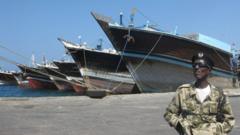The planned visit has raised concerns over U.S. influence amid Greenland's political sovereignty and local discontent.
Greenland's Reaction to High-Profile U.S. Delegation: A Diplomatic Tension Unfolded

Greenland's Reaction to High-Profile U.S. Delegation: A Diplomatic Tension Unfolded
Vice-President JD Vance's visit to Greenland highlights underlying geopolitical tensions regarding U.S. interests.
In a move that has been met with significant scrutiny, Vice-President JD Vance, along with a delegation of prominent U.S. officials, is set to visit Greenland—a remote outpost of Danish authority—primarily focused on a military base. The delegation comprises notable figures such as National Security Advisor Michael Waltz, Secretary of Energy Chris Wright, and Senator Mike Lee. This visit is in the wake of previous controversial remarks by former President Donald Trump regarding Greenland's mineral wealth and its strategic importance to U.S. security.
What was initially publicized as a cultural trip by Usha Vance—who was to engage in community events—has transformed into a visit characterized by political implications. Following the announcement of the trip, Greenland's Acting Prime Minister, Mute B Egede, labeled it a “provocation” and stressed that the government had not authorized any such visits. The local populace echoed these sentiments, expressing their discomfort and reluctance to extend a warm welcome to the American officials.
As skepticism grew regarding the real intent of the visit, arrangements for cultural engagements were promptly scrapped, focusing instead solely on military infrastructure at Pituffik Space Base. Political analysts have suggested that the U.S. delegation faced a potential public relations fiasco, noting the evident lack of enthusiasm from local leaders for the visit. The mayor of Sisimiut, where Usha Vance was expected to participate in community activities like a dog-sledding race, opted out of meeting with her, citing upcoming elections.
Amidst the public outcry, some Danish officials observed that this pivot in the visit’s agenda could be perceived as a reduction of hostilities from the U.S. side. Danish Foreign Minister Lars Lokke Rasmussen commented positively on the scaled-back itinerary and remarked on the "masterful spin" stemming from the changes. Vance’s historic visit, however, is indicative of the persistent American interest in Greenland as a strategic territory, especially given its geopolitical significance concerning Arctic navigation and military positioning.
In an era likened to Cold War tensions, the U.S. appears keen on asserting influence over Greenland—a place that supplements its strategic interests against competing global powers. Political scientists suggest that the ongoing discussions and the veiled intentions hint at a complex future relationship, one potentially fraught with challenges concerning sovereignty and diplomatic integrity in the Arctic region.
As the American delegation prepares to land in Greenland, the implications of their visit loom large. America’s aspirations on the island may signal the beginning of a more complicated and potentially contentious dialogue about the future of Greenland and its place in global geopolitics—one that echoes historical struggles yet takes shape in a contemporary context.
What was initially publicized as a cultural trip by Usha Vance—who was to engage in community events—has transformed into a visit characterized by political implications. Following the announcement of the trip, Greenland's Acting Prime Minister, Mute B Egede, labeled it a “provocation” and stressed that the government had not authorized any such visits. The local populace echoed these sentiments, expressing their discomfort and reluctance to extend a warm welcome to the American officials.
As skepticism grew regarding the real intent of the visit, arrangements for cultural engagements were promptly scrapped, focusing instead solely on military infrastructure at Pituffik Space Base. Political analysts have suggested that the U.S. delegation faced a potential public relations fiasco, noting the evident lack of enthusiasm from local leaders for the visit. The mayor of Sisimiut, where Usha Vance was expected to participate in community activities like a dog-sledding race, opted out of meeting with her, citing upcoming elections.
Amidst the public outcry, some Danish officials observed that this pivot in the visit’s agenda could be perceived as a reduction of hostilities from the U.S. side. Danish Foreign Minister Lars Lokke Rasmussen commented positively on the scaled-back itinerary and remarked on the "masterful spin" stemming from the changes. Vance’s historic visit, however, is indicative of the persistent American interest in Greenland as a strategic territory, especially given its geopolitical significance concerning Arctic navigation and military positioning.
In an era likened to Cold War tensions, the U.S. appears keen on asserting influence over Greenland—a place that supplements its strategic interests against competing global powers. Political scientists suggest that the ongoing discussions and the veiled intentions hint at a complex future relationship, one potentially fraught with challenges concerning sovereignty and diplomatic integrity in the Arctic region.
As the American delegation prepares to land in Greenland, the implications of their visit loom large. America’s aspirations on the island may signal the beginning of a more complicated and potentially contentious dialogue about the future of Greenland and its place in global geopolitics—one that echoes historical struggles yet takes shape in a contemporary context.





















